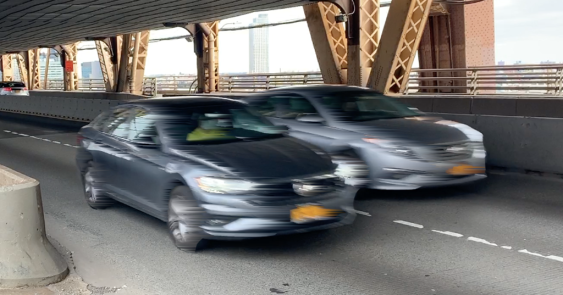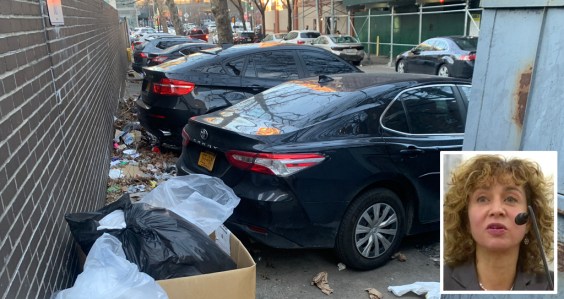StreetFilms
Ninth Avenue Renaissance Town Hall Meeting
Running time: 3:35
Monday night was the first meeting of the Ninth Avenue Renaissance project. About 130 neighborhood stakeholders filled the gym at the Holy Cross School in Midtown to begin a process to transform Ninth Avenue from a dysfunctional, traffic-choked, polluted highway into, what organizer Christine Berthet says should be "a neighborhood Main Street" for Hell's Kitchen and Clinton.
The evening's high point was Manhattan Borough President Scott Stringer's ten minute speech. Perhaps sensing a political vacuum in City Hall on these issues, Stringer is rapidly emerging as the city's leading elected official on traffic, transportation and Livable Streets. "Traffic congestion," Stringer said, is "the number one quality of life issue" for the borough of Manhattan and the city as a whole. And while other world cities are tackling their congestion problems, "everywhere you look in Manhattan there is a traffic jam, gridlock, pollution."
"The truth," Stringer said, "is that we have not had a new idea about transportation since we built the subways."
 Though he didn't mention him by name, Stringer (right) seemed to be pointing directly to Mayor Bloomberg's recent sustainability speech when he said "It is incredible when you think of all the damage we're doing to this city and the fact that we don't have bold, forward-thinking transportation planning when we know that we have one million more people coming here by 2030."
Though he didn't mention him by name, Stringer (right) seemed to be pointing directly to Mayor Bloomberg's recent sustainability speech when he said "It is incredible when you think of all the damage we're doing to this city and the fact that we don't have bold, forward-thinking transportation planning when we know that we have one million more people coming here by 2030."
Stringer also noted the non-existence of a citywide transportation strategy or even a serious public discussion about these issues in the current political environment. "Why can't we as a city have an intelligent conversation about traffic? Why can't we have a five Borough transportation agenda and talk about things that are controversial?" Stringer asked.
"I think we should talk about whether congestion pricing can work in New York City. There, I said it. Let's not have a political fight over this. Let's have a real dialogue. Let's talk about real sustainability. Let's have a discussion about bus rapd transit. Let's talk about bike lanes. Let's also talk about the fact that there is no reason why the poorest neighborhoods should get the most pollution."
If we don't talk about these things, Stringer warned, "The one thing I can guarantee is that, come 2030, we will be a second rate city and people will say, 'They didn't plan properly.'"
While Stringer somewhat stole the show, saying things that you simply don't hear any other citywide elected official saying these days, the main goal of the meeting was to provide neighborhood residents and stakeholders with the opportunity to talk about their local traffic and public space issues. While these kinds of open mic town hall meetings are sometimes hijacked by axe-grinders and loonies, virtually every single one of the twenty or so people who stood to talk were concise, eloquent and had something valuable to say.
A representative from St. Vincents hospital said that their emergency vehicle route time had increased because of Ninth Avenue congestion and the result has been an increasing number of "catastrophic incidents." In other words, their patients are dying in traffic. To applause, a number of residents called for better enforcement of honking, blocking the box and other motorist infractions. One guy, who introduced himself as living on "the southern shore of Lake Related" noted that traffic cops seem to emphasize "keeping the traffic moving rather than ticketing people who are blocking the box or honking their horns." He said that he sometimes tries to get the Port Authority cops at the Lincoln Tunnel to enforce these rules and they just say, "No. It's the city," and go back to reading their newspapers. A number of speakers brought up bicycling issues and spoke out in favor of George Haikalis and Roxanne Warren's Vision42 light rail plan.
 Next, Fred Kent from Project for Public Spaces (left) ran through a slide show about what makes great public spaces. Kent said that he thinks "we are going through a sea change in New York City" comparable to the environmental awakening that led to the first Earth Day in 1970. He senses that "there is a real passion for a very different future for New York City and it always comes back to the street. And once we begin to reclaim the street as a public space it will be a transformative agenda for New York City."
Next, Fred Kent from Project for Public Spaces (left) ran through a slide show about what makes great public spaces. Kent said that he thinks "we are going through a sea change in New York City" comparable to the environmental awakening that led to the first Earth Day in 1970. He senses that "there is a real passion for a very different future for New York City and it always comes back to the street. And once we begin to reclaim the street as a public space it will be a transformative agenda for New York City."
Kent described the avenues of Hell's Kitchen as an area filled with "chaos" and "unfit for human habitation the way it is currently managed." He urged the community to press for "a SWAT team approach by the city and Port Authority, to just pick a target and say, 'This area is going to be very different in a week,' and then just make it happen."
Finally, Tim Tompkins, president of the Times Square Alliance urged Livable Streets advocates to focus on three things as they work on these changes. First apologizing for the traffic created by his annual New Year's party, he delivered his advice in '70s TV show metaphor:
1. Just the facts: Focus on the problem. Study what's going on. Analyze the data and present information in the language that policy-markers understand.
2. Book 'em Danno: Enforcement is incredibly important. Work closely with the precinct. Fines and fees have to be strict and enforced.
3. Think in the long-term: Keep in mind what is happening 10 and 20 years out and know that even small changes take a long time to make happen in New York City.
The meeting was a pre-cursor to a design workshop that will take place Saturday January 20, 2007, 2 to 5 p.m. at the Holy Cross School, 322 west 43rd Street. The workshop will be facilitated by Project for Public Spaces.
 Though he didn't mention him by name, Stringer (right) seemed to be pointing directly to Mayor Bloomberg's recent
Though he didn't mention him by name, Stringer (right) seemed to be pointing directly to Mayor Bloomberg's recent  Next, Fred Kent from Project for Public Spaces (left) ran through a slide show about what makes great public spaces. Kent said that he thinks "we are going through a sea change in New York City" comparable to the environmental awakening that led to the first Earth Day in 1970. He senses that "there is a real passion for a very different future for New York City and it always comes back to the street. And once we begin to reclaim the street as a public space it will be a transformative agenda for New York City."
Next, Fred Kent from Project for Public Spaces (left) ran through a slide show about what makes great public spaces. Kent said that he thinks "we are going through a sea change in New York City" comparable to the environmental awakening that led to the first Earth Day in 1970. He senses that "there is a real passion for a very different future for New York City and it always comes back to the street. And once we begin to reclaim the street as a public space it will be a transformative agenda for New York City." 



